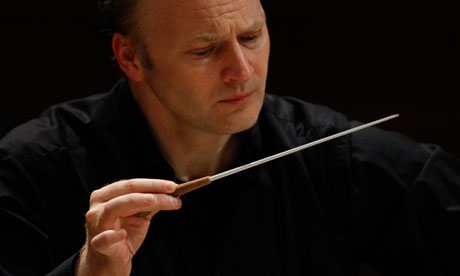
The new work in the BBC Philharmonic's Prom under its conductor laureate, Gianandrea Noseda, was Edward Cowie's Earth Music 1. Intended as the first in a series of short orchestral pieces celebrating wild places and warning of the threat of climate change, it reflects Cowie's scientific background and ecological concerns, as well as his work in the visual arts. Its overall scheme represents experiences of Australia's Great Barrier Reef – a noisy sunrise, three dives, shoals of fish, a manta ray and even a frenzied barracuda hunt – and might seem better suited to a wildlife film than to a purely sonic medium. Yet there are strong coloristic ideas over its nine-minute span, even if thematically the piece is less strong and its sense of direction is not readily apparent. Further instalments, inspired by Tanzania and the Arctic, are promised.
The rest of the programme focused on Russian music. Jean-Efflam Bavouzet was the soloist in Prokofiev's determinedly anti-Romantic Second Piano Concerto, a work of such appalling difficulty that it is a wonder anyone attempts to play it. Bavouzet began dreamily, before embarking on the huge technical challenges of its waywardly virtuosic writing, especially its two vast and nigh on impossibly perverse cadenzas. There were a few more wrong notes than Prokofiev intended, but the French pianist held his nerve, and his synchronised fingerwork in the moto perpetuo Scherzo was astounding; the result was a performance that rarely lost its focus.
The orchestra's finest hour came at the beginning of the programme with an account of Borodin's Prince Igor Overture that was taut in articulation and subtly nuanced in colouring; the Polovtsian Dances from the same opera were scarcely less good, just needing a touch more exotic wildness and, ideally, a chorus.
Noseda and his players gave a spirited account, too, of Tchaikovsky's Little Russian Symphony, which may not be his greatest work in the genre, but, in a performance as finely observed as this, it is surely the most delightful.

